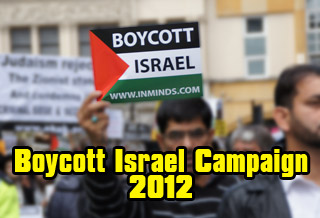
 Innovative Minds © 2014. All Rights Reserved. www.inminds.co.uk | ||||||||||||||
Boycott BluesDan Ephron, Newsweek Palestinians can't wreck Israel's economy by boycotting goods made in the settlements. So why are Israelis so worked up?  Bibi is not amused: Israel's government has deported several instigators. By presidential decree, Palestinians this month began boycotting products manufactured in Israeli settlements—part of the nonviolent campaign to end Israel's 43-year occupation of the West Bank. Considering the numbers involved and the overall strength of Israel's economy, the direct effect of the ban will probably be negligible. About 2 or 3 percent of the $44 billion in goods Israel exports are made in the settlement areas, according to estimates by economists (Israel does not break down manufacturing data by region). Of those settlement-manufactured products, only a small percentage ends up in the Palestinian market. Yet Israeli officials have reacted sharply. At a committee meeting convened in Israel's Parliament, lawmakers proposed harsh retaliatory measures, including making it harder for Palestinians to import goods from other countries. "Our port is their oxygen tube and closing it will only hurt them, not us," said Shraga Brosh, head of the Manufacturers Association of Israel. "This way, we will show them that after their slap in the face, we will not turn the other cheek." Danny Ayalon, the deputy foreign minister, said Israel would try to prevent the Palestinian Authority from joining the World Trade Organization (as an observer) and possibly block the transfer of some European donations to Palestinians.
Israelis fear that a successful boycott of settler goods would catch on elsewhere. While consumers in the Palestinian territories lack the economic muscle to inflict much pain on Israel, their counterparts in Europe—Israel's biggest market—have plenty of leverage.
So if the direct impact is expected to be minimal, why the hysteria? For one thing, Israelis fear that a successful boycott of settler goods would catch on elsewhere. While consumers in the Palestinian territories lack the economic muscle to inflict much pain on Israel, their counterparts in Europe—Israel's biggest market—have plenty of leverage. Shir Hever, an Israeli economist who writes about the cost of Israel's occupation of the West Bank, says if Palestinians manage to assemble a comprehensive list of Israeli companies with settlement ties, that alone could jump-start a boycott campaign in Europe. Left-wing groups in Europe and the U.S. have had little success with their broader "Boycott, Divestment and Sanctions" campaign, perhaps in part because it seems aimed at delegitimizing Israel generally and not just Israeli rule over Palestinians. Israelis worry that a targeted boycott of settlement-made goods—something considerably less radical—would have a better chance of gaining momentum, and they might be right. Then there's the comfort-zone issue. Thwarting bombings and shootings requires careful intelligence work and a first-rate military, things Israel has honed for decades. Countering nonviolent action has always seemed more challenging. As a result, Israeli officials have stumbled and occasionally overreacted. When Palestinian-American Mubarak Awad, virtually unknown in the West Bank and unconnected to any political group, founded a nonviolent center in the 1980s and organized tax strikes and sit-ins, Israel deported him. Just last week, Israel deported Prado the Clown, who had arrived from Spain to organize an end-the-occupation festival in Ramallah. Finally, boycotts stir bad memories for Israelis. For decades, the Arab League's boycott of Israel kept huge multinationals from doing business in the Jewish state, including Pepsi, McDonald's, and most of the major Japanese car companies (though not all: visitors to Israel in the 1980s might have noticed one in four cars on the road was a Subaru). It wasn't until the Israeli-Palestinian Oslo accords in 1993 that the boycott was eased (though Israeli exports are still officially banned in most Arab countries). A return to the bad old days must be a bitter pill for most Israelis. Even when it's administered by a clown. Source: http://www.newsweek.com/id/237960 Related ArticlesAlso Of InterestPage URL: http://www.inminds.co.uk/article.php?id=10397
|
|
Support Us
If you agree with our work then please support us.Campaigns INMINDS Facebook Live Feed Latest Video's
INMINDS Twitter Feed Tweets by @InmindsComFeatured Video's
You need Flash player 8+ and JavaScript enabled to view this video.
[all videos (over 200)..] Featured MP3 Podcast  "The United States is 4.6% of the worlds people but still controls 50% of the worlds wealth and has a military that spends more than every other country in the world combined. I see this moment, as a moment that is very dangerous.. which is to say that the United States is a declining world economic power, similarly a declining political power, but what isn't declining is the military power. As you know from the 20th century that's a dangerous combination - a declining economic and political power but an overwhelmingly dominant military power. I think the national security state that we've seen organised since 9-11 in an unbelievably rapid way, which owes in no small part to Israel I must say, is a particular [example]." A founding member of the Weather Underground Meeting with members of 'Smash EDO' in Tel Aviv, April 2010 [88min / 40Mb] [all podcasts..] Newsletter Feedback |
 |
 |






















































